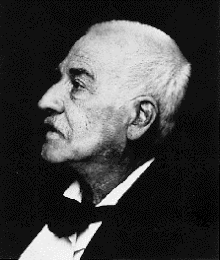Jacob Burckhardt
Jump to navigation
Jump to search

Carl Jacob Christoph Burckhardt (25 May 1818 – 8 August 1897) was a Swiss historian of art and culture and an influential figure in the historiography of both fields. He is known as one of the major progenitors of cultural history. Sigfried Giedion described Burckhardt's achievement in the following terms: "The great discoverer of the age of the Renaissance, he first showed how a period should be treated in its entirety, with regard not only for its painting, sculpture and architecture, but for the social institutions of its daily life as well."
Quotes
[edit]The Greeks and Greek Civilization (1998 version)
[edit]- In the life of the mind they [the Greeks] reached frontiers which the rest of mankind cannot permit themselves to fall short of, at least in their attempts to acknowledge and to profit, even where they are inferior to the Greeks in the capacity for achievement. It is for this reason that posterity needs to study the Greeks; if we ignore them we are simply accepting our own decline.
- p. 12
- Their knowledge and their faculty of observation were extraordinary. By their study of the world the Greeks illuminate not only their own nature but that of all other ancient peoples; without them, and the phillhellenic Romans, there would be no knowledge of past times, for all other nations attended to nothing but themselves, their own citadels, temples and gods.
- p. 12
- All subsequent objective perception of the world is only elaboration on the framework the Greeks began. We see with the eyes of the Greeks and use their phrases when we speak.
- p. 12
Quotes about Jacob Burckhardt
[edit]- Burckhardt's Cultur der Renaissance in Italien is the most penetrating and subtle treatise on the history of civilisation that exists in literature; but its merit lies in the originality with which the author uses common books, rather than in actually new investigations.
- Lord Acton, 'The Borgias and Their Latest Historian', The North British Review (January 1871), quoted in Lord Acton, Historical Essays & Studies, eds. John Neville Figgis and Reginald Vere Laurence (1907), pp. 65-66
- In reality, then, it was the Swiss historian, Jakob Burckhardt, who in 1860 established the concept that has been current in our time—the idea of a Renaissance as a general movement, particularly associated with the fifteenth century, coming to its climax around the year 1500, and primarily taking place in Italy. It was Burckhardt who conceived of the term Renaissance as descriptive of a whole historical period, as a great chapter in Italian history, and as a decisive stage or turning-point in the development of an entire civilisation, so that things which had hitherto been considered separate—the development of the modern state, for example—had now become enveloped by the concept too. And Burckhardt was one of the founders of what we call Kulturgeschichte, coming to this particular subject, indeed, with many of the prepossessions of the art-historian.
- Herbert Butterfield, Man on His Past: The Study of the History of Historical Scholarship (1955), pp. 132-133
See also
[edit]- Numa Denis Fustel de Coulanges - for a comparable approach to the fall of the ancient polity more generally
